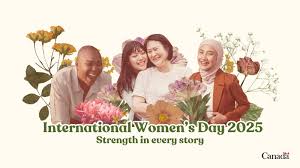Ottawa – Canada is committed to protecting and advancing gender equality, human rights, and democracy. Creating communities that treat women and girls as equals is one of the most effective ways to reduce poverty and build stronger economies. Inclusive economies open new markets for businesses and strengthen Canada’s trade relationships. Gender equality also accelerates other development objectives like social inclusion, good health, quality education, peace and protecting the environment.
Today in Ottawa, to mark International Women’s Day, Anita Vandenbeld, Parliamentary Secretary to the Minister of International Development, on behalf of Ahmed Hussen, Minister of International Development, announced 20 projects aimed at advancing gender equality and empowering women and girls, in all their diversity, representing a contribution of $193.45 million.
Parliamentary Secretary Vandenbeld also announced Canada’s intent to provide $10 million for Equality Fund’s upcoming First Response Fund. This fund will provide support to women-led and women’s rights organisations who are often best placed to provide timely humanitarian assistance to the most vulnerable people affected by crises.
Canada is a long-standing international leader on women’s rights, including sexual and reproductive health and rights, and gender equality. Canada works with partners around the world to address the systemic barriers and harmful social norms that prevent women and girls from reaching their full potential at work, at home and as engaged members of their communities. Canada’s investments in signature initiatives, such as the Women’s Voice and Leadership Program, the Equality Fund and the Alliance for Feminist Movements, have supported more than 3,000 women’s rights organization and networks in more than 30 countries and have influenced over 200 discriminatory policies and laws. Canada’s contributions have provided relevant, effective support for thousands of women and girls, 2SLGBTQI+ people and their communities.
As set out in its Feminist International Assistance Policy, Canada continues to take action on gender equality globally and towards the achievement of the UN’s Sustainable Development Goals. Canada’s largest and longest financial commitment in international development assistance represents a 10-Year (2020-2030), 1.4-billion annual investment in the health and rights of women and girls globally.
Minister Ien, Head of the Delegation of Canada, to UNCSW 69th Session, said:
Thirty years ago, something amazing happened – the Beijing Declaration and Platform for Action set out an ambitious roadmap for achieving the equal rights of all women and girls.
At the time, it was expected that thirty years later, the conversation would be about how to go even further, yet today, the reality is that progress seems to be moving backwards.
Over the last year, we have seen growing threats to gender equality, to the rights of women and girls, and to the freedoms of 2SLGBTQI+ communities.
We are seeing politicians question the value of intersectionality and of supporting an inclusive society.
Sexual and reproductive rights are being rolled back, while women’s health is being forgotten.
Discrimination, hate, and violence continue to fuel anti-gender ideologies and are threatening the safety of women and girls around the world.
And thirty years later, there are women who still face barriers that impact their education, career advancement, and their income. These barriers disproportionately impact Indigenous, Black, other racialized people, and members of 2SLGBTQI+ communities.
We know that challenges to achieving equality are complex and that there is not a one-size-fits-all solution, but we also know that we cannot lose the progress we have already achieved. We all have a role to play in making sure we move forward, and Canada is committed to do just that.
Canada and its partners have been long-standing global leaders for advancing gender equality. We continue our efforts to end gender-based violence, support women’s full participation in the economy, enable women’s access to leadership roles, and protect the human rights of women, girls, and 2SLGBTQI+ people.
In our efforts to end gender-based violence, Canada has made historic progress by implementing our National Action Plan to End Gender-based Violence, ensuring victims, survivors, and their families have access to the services they need, while at the same time addressing its root causes, including systemic inequalities and discrimination.
And amid increased attacks on people’s rights and growing global uncertainty, Canadian leadership in promoting and protecting human rights as a core element of Canada’s feminist foreign policy is more important than ever.
That’s why last week, on March 7, Canada signed the Inter-American Convention on the Prevention, Punishment and Eradication of Violence against Women – also known as the Belém do Pará Convention, signaling our continued commitment to advancing the rights of women and girls.
Canada is also increasing efforts to help set women up for success by fostering women’s economic empowerment and unlocking access to finances, training, and mentorship.
We are also improving affordability and housing access while addressing systemic barriers to women’s employment.
Canada is investing in the early learning and child care sector to help parents, particularly mothers, participate in the job market. This investment also creates and sustains jobs for workers in the sector, many of whom are women.
Over the past 2 years, the labour force participation rate for women in Canada hit a record high, surpassing 85 per cent – providing further proof that when you support women, economies thrive.
To achieve true and lasting gender equality, Canada cannot do it alone, which is why through our Feminist International Assistance Policy, we are providing investments to build a more peaceful, more inclusive, and more prosperous world.
In Canada, our progress has been a result of the incredible efforts of many advocates and partners, including Indigenous Peoples, civil society organizations, women’s and human rights organizations, as well as provincial and territorial representatives. There has been true collaboration, and for this we are grateful.
When women and girls are supported and safe, not only do they soar, but they inspire others to do the same. That is the world we are all striving to create together – one where all people are equal.








